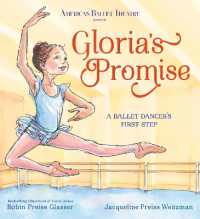Full Description
This book began as a deep discussion among administrators, teachers, researchers, teacher educators, and educational consultants concerned about the critical reduction of play, engaged learning opportunities, and intellectually stimulating experiences in classrooms for toddlers through the primary grades. This group made a pact to organize and stand up for engaged learning by creating a comprehensive, research-based defense that they call The Manifesto. In Growing Child Intellect, this panel of experts pulls together the research, stories, and lessons learned from using the Project Approach in a variety of settings. Readers are invited to dive deeply with them into the world of project work, beginning with the neuroscience foundation, through the research in the field, and on to the challenges and successes.Book Features:
Provides a strong review of research on the benefits of the Project Approach.
Explains research on the development of intellect from Mind Brain Education Science.
Includes extensive examples of intellectually stimulating classrooms and learning experiences across diverse settings.
Shows how to bring engaging experiences into classrooms while still meeting goals for required content and standards.
Explains what each person can do, no matter position or program, to nurture children's intellectual development.
Provides practical advice for overcoming common challenges to implementing project work.
Offers a short Declaration of Beliefs about engaged learning for easy sharing
"Voices from the Field" projects:
The Path Project: Following Children's Lead (pre-K)
Powerline Project (1st grade)
Reptile Project: Including Everyone (kindergarten)
Roots of Intellectual Development: The Construction Project (toddler-pre-K program)
Administrator's Story: Bringing Project Work to a Charter School
Contents
Contents (Tentative)
Part I:Why Engaged Learning? Why Now?
Chapter 1: Bringing Intellectual Deserts to Life
Judy Harris Helm & Karrie A. Snider, with Sue Vartuli
The Classroom as an Intellectual Desert
Growing and Sustaining Classrooms Where Thinking Happens
Overview of This Book
References
Voices from the Field: The Path Project
Rebecca Teall, Prekindergarten Teacher
Chapter 2: Curriculum that Supports Intellectual Development
Judy Harris Helm, Maggie Holley, & Sue Vartuli
Insights from Mind, Brain, and Education Science
Judy Harris Helm
A Reexamination of Common Curriculum Approaches
Maggie Holley & Sue Vartuli
Conclusion
References
Voices from the Field: The Power Lines Project
Nick Pettit, First-Grade Teacher
Chapter 3: Curriculum Research on the Project Approach: Illuminating the "What" and the "How" of Teaching and Learning
Karrie A. Snider & Sue Vartuli
Why We Don't Know More: Challenges to Project Approach Curriculum Research
What We Do Know! The Current Research Base on Project Work
Conclusion
References
>Voices from the Field: Engaging Teacher Candidates in Project Work
Karrie A. Snider & Natalie Tye, Teacher Educators
Part II: Making Engaged Learning Happen: Navigating the Diverse Nature of Teaching, Thinking, and Learning
Chapter 4: Creating 21st Century Learners: Integrating Projects and Standards
Rebecca A. Wilson, Pam Scranton, & Tricia DeGraff
Developing 21st Century Learners
Rebecca A. Wilson
Standards Come to Preschool
Pam Scranton
Projects—A Woven Tapestry of Learning Standards and Integrated Concepts
Tricia DeGraff
Summary: Putting It All Together in Our Programs
References
Voices from the Field: The Construction Project
Pam Scranton, Center Director
Chapter 5: Project Work: A Path to Engaged Learning for All Children
Karrie A. Snider, Rebecca Wilson, Pegi Stamps, & Carol Bolz
Integrating Research-Based Strategies and the Project Approach to Support Dual Language Learners
Rebecca A. Wilson
Implementing Projects in Special Education Classrooms
Pegi Stamps & Carol Bolz
Understanding the Potential of Children's Capacity to Learn
Karrie A. Snider
The Potential of the Project Approach for Today's Youth
References
Voices from the Field: The Reptile Project
Crystal Woodin, Kindergarten Teacher
Chapter 6: Professional Development Models to Support Teaching with the Project Approach
(Carol Bolz), Catherine Wilson, Erika Gray, Pam Scranton, Lisa Roti, Pegi Stamps, & Liz Smith
Characteristics of Successful Programs
Catherine Wilson & Carol Bolz
Kohl Children's Museum Early Childhood Connections Program
Erika Gray
Becoming Young Thinkers Summer Institute
Pam Scranton
Nature Connections: The Power of Collaboration
Lisa Roti
Coaching with the Project Approach and CLASS
Carol Bolz, Pegi Stamps, Liz Smith, & Catherine Wilson
Conclusion
References
Voices from the Field: Bringing Project Work to an Elementary School
Tricia DeGraff, Executive Director
Part III: The Manifesto on Active, Engaged Learning Through the Project Approach
Chapter 7: Moving Forward with the Project Approach
Karrie A. Snider, Sue Vartuli, & Judy Harris Helm
The Manifesto Delphi Study
The Manifesto for Engaged Learning
Call to Action: How We Move Forward
References
Chapter 8: Manifesto Call to Action: Growing Child Intellect Through the Project Approach
Karrie A. Snider, Sue Vartuli, & Judy Harris Helm
Calling Teachers to Action
Calling Administrators to Action








